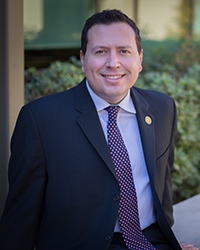People Will Propel UC Merced Toward 2020 Project Vision
 With the 2020 Project, our campus stands at the threshold of maturity and self-sufficiency.
With the 2020 Project, our campus stands at the threshold of maturity and self-sufficiency.
Many components are involved: faculty enhancements; student-services delivery; research and marketplace ideation and incubation; development and alumni relations; financial resource management; and design, construction and administrative support servicing.
The common threads that tie together these diverse organizational units are the staff members who will propel the campus over the finish line in the next five years.
Last fall, we began Strategic Workforce Planning, a major initiative to align our staffing model with this future, self-sufficient state. Simply put, workforce planning asks the question “How can your department most efficiently organize to achieve the academic goals of the 2020 Project?”
While Strategic Workforce Planning efforts continue, phase one illustrated the myriad complex functions needed for us to perform if UC Merced is to achieve self-sufficiency. Phase one — and its accompanying budget reconciliation process — also illustrated the financial prudence we must exercise in order to be successful.
A proliferation of hundreds of additional staff full-time equivalents (FTEs) is not feasible under current financial forecasts. Coordination between strategic growth in additional staff members and professional development of existing staff are essential as we move forward.
Therefore, from a human resources perspective, ongoing performance management becomes foundational, binding the core functions/deliverables identified in workforce planning with the self-sufficiency goals of the 2020 Project.
Why do I list performance management as one of the cornerstones for the 2020 Project’s success? I ask you to consider the following:
- The purpose of workforce planning is to align our staffing model with a future, self-sufficient UC Merced;
- Phase one identified the functions needed in order for UC Merced to attain self-sufficiency;
- Those functions represent the deliverables of a unit, department, and/or division that drive Project 2020 success;
- We must package these functions/deliverables into our respective job descriptions; and
- We will ensure that staff performance is achieving 2020 Project goals through ongoing feedback and development (e.g., performance management).
Performance management, then, marries the functional output of each and every staff member with the overall achievement of the 2020 Project, serving as the medium by which we assess, calibrate and communicate our individual performances and our collective delivery.
Measuring performance of existing job accountabilities is one thing. What about opportunities for growth and development? Here is where the power of performance management is fully realized.
Remember that current financial forecasts do not project the addition of hundreds of FTEs. In fact, the current forecast places the number at approximately 130-plus FTEs over the next five years.
Recall, too, that phase one of workforce planning identified an exhaustive list of functions to be performed in order for UC Merced to achieve self-sufficiency. As we reassess and prioritize these identified functions during forthcoming workforce planning phases, gaps will inevitably develop: gaps between existing staff headcount versus the volume of functions to be performed.
Within these gaps exist significant opportunities for career advancement.
How so? We have to close this gap between functions and people. So, we are reassessing our phase one workforce planning.
Some functions will be consolidated, some outsourced and still others critical and outstanding. New positions will then be created strategically, either for recruitment or for promotion.
Herein lies your opportunity. We can’t afford prolific growth in new staff; equally so, we can’t afford to neglect your professional growth. By your efforts, we have grown UC Merced to this point. We need that same partnership and commitment to take the campus to its next point: self-sufficiency.
Via ongoing goal setting, feedback and calibration (e.g., performance management), you are invited into a conversation about how you fit into WFP and UC Merced’s future. This will generate dialogue with your supervisor in which you identify opportunities for professional development and career advancement.
In this manner, performance management becomes a positive, ongoing cultural norm at UC Merced — one that is foundational as we move from start-up to self-sufficiency.
Indeed, performance management is a cornerstone of our future success.
The timing of this conversation couldn’t be better, as we just concluded our first year using the Halogen eAppraisal tool and are in the midst of feedback sessions to identify and implement needed enhancements to our appraisal product. As we move forward, I encourage you to remember the core components of effective performance management:
- Goal setting
- Self-discovery
- Honest and constructive feedback
- Operational improvement
As workforce planning unfolds, engage your supervisor in an ongoing assessment of your department’s functional gaps. Within those gaps, do you and your supervisor agree that there are opportunities for you to grow?
Then, align those gap opportunities to your professional development plan so that you grow as the university grows.
Where my team and I can assist you, we most assuredly will, as the success of the 2020 Project and UC Merced’s realization of self-sufficiency rises or falls on the quality and engagement of our most important resource: our dedicated staff.
Thank you for this opportunity to share my thoughts and ideas with you. I look forward to future conversations on this and other HR initiatives as we move ahead.
Brian Powell is assistant vice chancellor for Human Resources at UC Merced.
